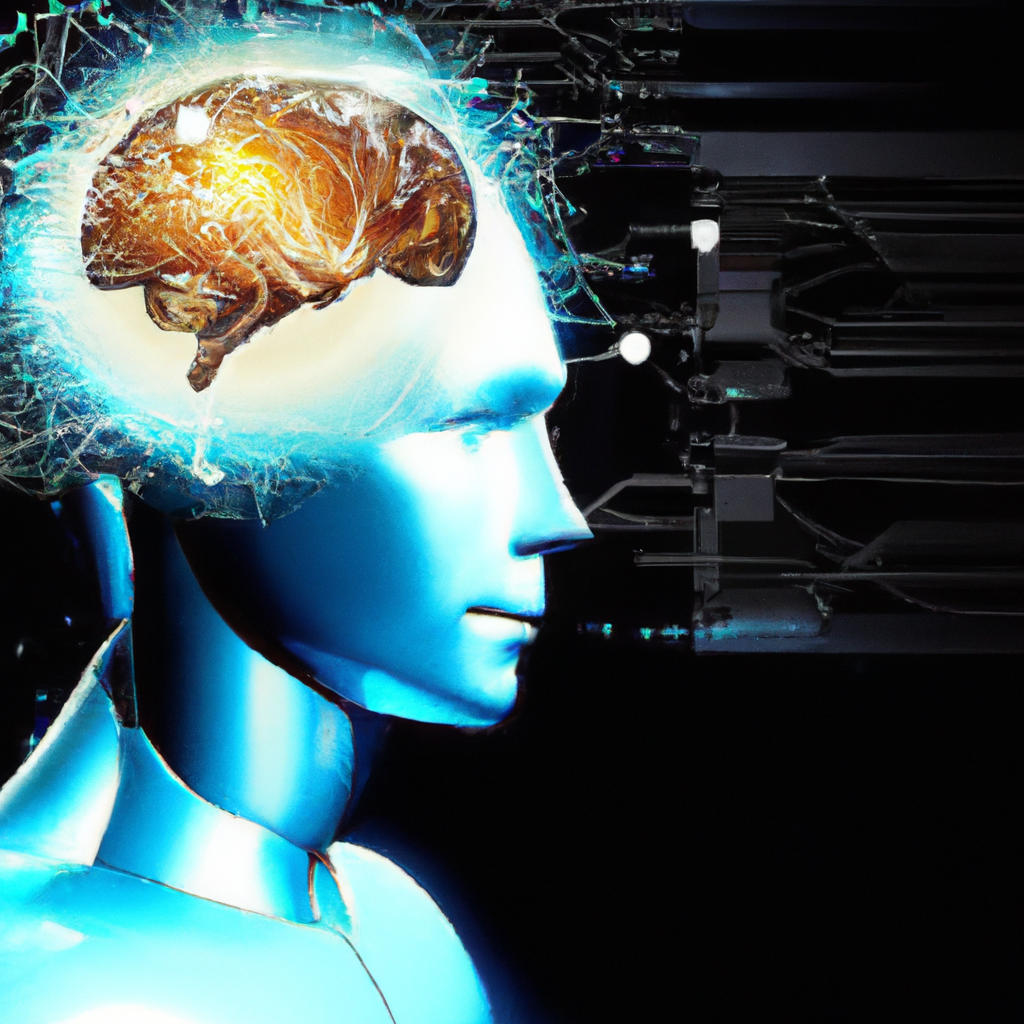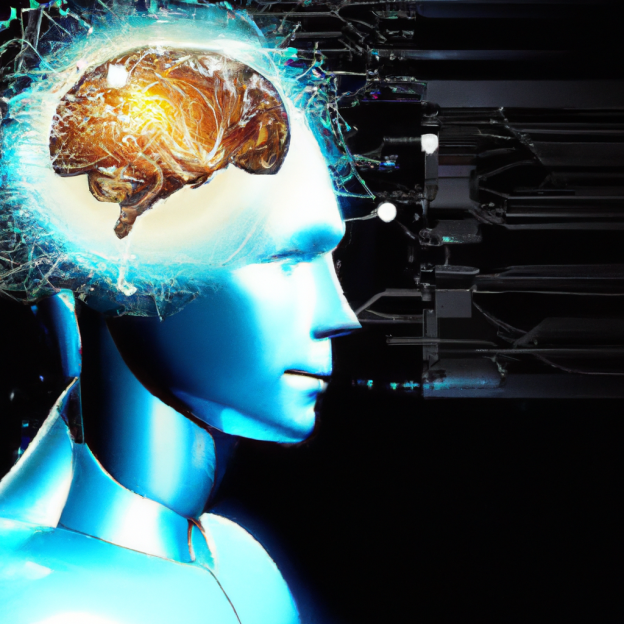Let’s talk about how AI is revolutionizing the marketing industry. With the rapid advancements in technology, artificial intelligence has become a game-changer for marketers across various industries. From personalized customer experiences to automated data analysis and predictive analytics, AI is reshaping the way businesses target their audience and drive growth. In this article, we will explore the significant ways in which AI is transforming marketing strategies and helping businesses stay ahead in today’s competitive landscape.

Personalization and Customer Segmentation
Improved customer segmentation
AI technology has revolutionized the way businesses approach customer segmentation. With the ability to analyze massive amounts of data in real-time, AI algorithms can identify distinct customer segments based on their preferences, behaviors, and demographics. This level of precision allows marketers to tailor their marketing strategies and messages to specific customer groups, resulting in more effective campaigns and higher conversion rates.
Hyper-personalized marketing campaigns
Thanks to AI, marketers can now create hyper-personalized marketing campaigns that are tailored to each individual customer. By leveraging customer data, AI algorithms can generate personalized recommendations, offers, and advertisements that are highly relevant to each customer’s unique needs and preferences. This level of personalization not only enhances the customer experience but also increases the likelihood of customer engagement and loyalty.
Real-time customer insights
In the past, marketers had to rely on historical data and gut feelings to make decisions. However, with AI-powered analytics tools, businesses can now gain real-time insights into customer behavior and preferences. By analyzing live data streams from various sources, AI algorithms can identify patterns, trends, and correlations that allow marketers to make data-driven decisions and seize opportunities in the moment. This real-time feedback loop enables businesses to stay agile and responsive in an ever-changing marketing landscape.
Enhanced customer experience
AI technologies such as chatbots and voice assistants have transformed the way customers interact with businesses. These intelligent virtual assistants can provide instant and personalized support, answer customer queries, and even assist with purchasing decisions. By enhancing the customer experience through AI-powered automation and personalization, businesses can build stronger relationships with customers, increase customer satisfaction, and ultimately drive loyalty and retention.
Content Creation and Curation
Automated content generation
AI has the potential to revolutionize content creation by automating the process of generating high-quality, engaging content. Natural Language Processing (NLP) algorithms can analyze vast amounts of data and create content that is indistinguishable from that written by a human. This not only saves time and resources but also allows businesses to create a consistent stream of fresh and relevant content to engage their target audience.
Content curation and recommendation
With the abundance of content available, businesses often struggle to curate and recommend the most relevant content to their audience. AI-powered recommendation systems can leverage machine learning algorithms to analyze customer behavior and preferences, and suggest personalized content recommendations. This not only helps businesses increase customer engagement but also improves SEO and keyword targeting by offering relevant content to users based on their search queries.
Improved SEO and keyword targeting
AI algorithms can analyze vast amounts of data to identify trends and patterns in keyword usage, search queries, and user behavior. By leveraging these insights, businesses can optimize their SEO strategies and improve keyword targeting. AI-powered tools can recommend the most relevant keywords, suggest content optimizations, and even predict changes in search engine algorithms, helping businesses stay ahead of the competition and increase their online visibility.
Data-driven Decision Making
Data analytics and predictive modeling
AI-powered data analytics tools enable businesses to collect, analyze, and derive insights from vast amounts of data. By leveraging machine learning algorithms, businesses can uncover hidden patterns, correlations, and trends in their data, allowing them to make data-driven decisions. Predictive modeling algorithms can also forecast future outcomes and trends based on historical data, helping businesses anticipate customer needs, optimize marketing strategies, and drive growth.
Optimized marketing strategies
AI algorithms can analyze large datasets and identify the most effective marketing strategies for specific customer segments. By identifying correlations between marketing activities and customer responses, businesses can optimize their marketing strategies to maximize ROI. AI-powered tools can suggest the best channels, messages, and timing for campaigns, enabling businesses to allocate their marketing budget more efficiently and achieve better results.
Budget optimization and ROI calculation
With the help of AI-powered tools, businesses can optimize their marketing budgets by identifying the most effective allocation of resources. By analyzing historical campaign data and customer behavior, AI algorithms can recommend the optimal budget allocation across various marketing channels and tactics. Additionally, AI algorithms can calculate the Return on Investment (ROI) of marketing campaigns, enabling businesses to measure the effectiveness of their marketing efforts and make informed decisions about future investments.
Improved decision-making processes
AI technologies can support businesses in making better decisions by providing data-driven insights and recommendations. By automating time-consuming tasks, such as data analysis and report generation, AI-powered tools free up marketers’ time to focus on strategic decision-making. With AI-generated insights and recommendations, businesses can make more informed decisions, reduce the risk of human error, and increase the likelihood of success in their marketing initiatives.

Chatbots and Conversational Marketing
AI-powered chatbots for customer interaction
Chatbots have become an increasingly common sight on websites, social media platforms, and messaging apps. These AI-powered virtual assistants can provide instant, 24/7 customer support, answer frequently asked questions, and even assist with purchasing decisions. By automating customer interactions, businesses can provide faster and more efficient customer service, leading to improved customer satisfaction and loyalty.
24/7 customer support
AI-powered chatbots can provide round-the-clock customer support, eliminating the need for businesses to allocate resources to handle customer inquiries during non-business hours. Customers can get instant responses to their queries, regardless of the time of day, which enhances the overall customer experience and increases customer satisfaction. With AI chatbots handling routine and repetitive inquiries, human customer service teams can focus on more complex and high-value customer interactions.
Natural language processing and sentiment analysis
AI-powered chatbots are equipped with Natural Language Processing (NLP) capabilities, allowing them to understand and respond to customer inquiries in a conversational manner. NLP algorithms can analyze and interpret customer sentiments, enabling chatbots to provide empathetic and personalized responses. By understanding the context and emotions behind customer inquiries, businesses can deliver more relevant and engaging customer interactions, fostering stronger relationships with their customers.
Targeted Advertising and Media Buying
Programmatic advertising
AI-powered programmatic advertising platforms automate the process of buying and placing digital advertisements. By leveraging machine learning algorithms, programmatic advertising platforms can analyze customer data in real-time to identify the most relevant ad placements for each individual user. This level of targeting not only increases the effectiveness of advertising campaigns but also improves cost-efficiency, as businesses can allocate their ad spend to reach the most valuable audiences.
Real-time bidding and ad placement
AI-powered programmatic advertising platforms enable real-time bidding on ad placements, allowing businesses to optimize their ad spend and achieve maximum reach and impact. By analyzing user behavior, demographics, and contextual information, AI algorithms can determine the optimal bid for each ad placement, ensuring that businesses get the best value for their advertising budget. Real-time ad placement also allows businesses to react quickly to market changes and adjust their campaigns accordingly.
Identifying high-value ad placements
AI algorithms can analyze vast amounts of data to identify high-value ad placements, such as websites and apps with a high concentration of target customers. By leveraging data on user behavior, demographics, and preferences, AI-powered advertising platforms can recommend the most relevant and high-performing ad placements for each campaign. This level of precision increases the likelihood of reaching the right audience and maximizing the return on ad spend.
Improved ad targeting and personalization
AI-powered advertising platforms can utilize customer data to enhance ad targeting and personalization. By analyzing customer behavior and preferences, AI algorithms can segment audiences and deliver highly targeted and personalized ads. This personalized approach increases the relevance and effectiveness of advertising campaigns, leading to higher conversion rates and ROI. By delivering ads that resonate with individual customers, businesses can create more meaningful connections with their target audience.
Customer Relationship Management (CRM)
Automated lead generation and nurturing
AI-powered tools can automate the lead generation process, allowing businesses to capture and qualify leads more efficiently. By leveraging machine learning algorithms, businesses can analyze customer data and behavior to identify potential leads and determine their likelihood of conversion. AI-powered lead nurturing tools can also automate personalized follow-ups and recommendations, ensuring that leads are engaged and nurtured throughout the customer journey.
Customized customer journeys
AI technologies enable businesses to create customized customer journeys that are tailored to each individual customer. By analyzing customer data and behavior, AI algorithms can identify the most relevant touchpoints and interactions for each customer, optimizing the customer journey for maximum engagement and conversion. This personalized approach not only enhances the customer experience but also increases the chances of cross-selling and upselling.
Sales and customer service automation
AI-powered tools can automate various sales and customer service tasks, such as order processing, invoice management, and support ticket routing. By automating routine tasks, businesses can free up their sales and customer service teams to focus on high-value activities, such as building customer relationships and handling complex inquiries. This automation not only improves efficiency and accuracy but also enables businesses to provide faster and more reliable service to their customers.
Effective cross-selling and upselling
AI algorithms can analyze customer data and behavior to identify cross-selling and upselling opportunities. By leveraging machine learning algorithms, businesses can predict customer needs and preferences, and recommend relevant products and services. This level of personalization allows businesses to increase their average order value and customer lifetime value, while also enhancing the customer experience by offering tailored recommendations and promotions.
Market and Competitive Analysis
Tracking market trends and competitor activities
AI-powered tools can analyze vast amounts of data to keep businesses informed about market trends and competitor activities. By monitoring social media conversations, news articles, and industry reports, AI algorithms can identify emerging trends, spot potential threats, and uncover untapped opportunities. This real-time market intelligence allows businesses to stay ahead of the competition and make more informed strategic decisions.
Automated competitor analysis
AI technologies can automate competitor analysis by analyzing a wide range of data sources, such as websites, social media profiles, and customer reviews. By leveraging machine learning algorithms, businesses can gain insights into their competitors’ strengths, weaknesses, and market positioning. This analysis enables businesses to benchmark their performance, identify gaps in the market, and develop strategies to gain a competitive advantage.
Real-time pricing optimization
AI-powered pricing optimization tools can analyze market data, customer behavior, and competitor pricing to recommend the optimal pricing strategy. By leveraging machine learning algorithms, businesses can set prices that maximize revenue and profitability while remaining competitive in the market. Real-time pricing optimization allows businesses to react quickly to changes in demand, competition, and other market factors, ensuring that they always offer the most attractive and profitable prices.
Social Media Management
Automated social media posting and scheduling
AI-powered social media management tools can automate the process of posting and scheduling content across multiple social media platforms. By analyzing user behavior, engagement rates, and historical data, AI algorithms can recommend the optimal timing, frequency, and format of social media posts. This automation saves marketers time and effort, while also ensuring a consistent and engaging social media presence.
Sentiment analysis and social listening
AI algorithms can analyze social media conversations and user-generated content to gauge public sentiment towards a brand, product, or campaign. By monitoring mentions, comments, and hashtags, businesses can gain insights into how their brand is perceived and make data-driven adjustments to their marketing strategies. Social listening powered by AI allows businesses to understand their audience better, identify pain points, and respond to customer feedback in real-time.
Identifying influencers and brand advocates
AI-powered tools can analyze social media data to identify influencers and brand advocates who have a significant impact on their target audience. By analyzing engagement rates, follower demographics, and content relevancy, AI algorithms can identify influential individuals or profiles that align with a brand’s values and target market. This allows businesses to collaborate with influencers and brand advocates to amplify their reach, drive brand awareness, and enhance their social media marketing efforts.
Voice Search Optimization
Optimizing content for voice search
As voice assistants like Siri, Alexa, and Google Assistant become increasingly popular, businesses must optimize their content for voice search. AI-powered Natural Language Processing algorithms can analyze search queries and intent to identify the most relevant and conversational content. By optimizing content for voice search, businesses can increase their visibility in voice search results and provide the information that users are searching for in a format that suits their conversational search queries.
Voice-activated marketing campaigns
AI-powered voice assistants enable businesses to create voice-activated marketing campaigns that engage customers through voice interactions. By leveraging voice-based technology, businesses can build interactive and immersive experiences that align with their brand and resonate with their target audience. Voice-activated marketing campaigns can range from audio advertisements and voice-based promotions to interactive voice games and experiences, providing businesses with new opportunities to connect with their customers.
Voice-enabled customer service and purchasing
AI-powered voice assistants can provide customers with real-time, voice-enabled customer service and purchasing experiences. With the ability to understand and respond to voice commands, voice assistants can assist customers with product inquiries, order placements, and issue resolutions. This convenient and hands-free approach enhances the customer experience by providing instant, personalized support, and simplifying the purchasing process. Voice-enabled customer service can also reduce the burden on human support teams, allowing them to focus on more complex and high-value customer interactions.
Ethical Considerations
Privacy concerns and data security
As AI technologies become more prevalent in marketing, businesses must address privacy concerns and ensure the security of customer data. AI algorithms rely on vast amounts of data to deliver personalized experiences, which raises concerns about data privacy and potential misuse of personal information. Businesses must adopt robust data protection measures, adhere to privacy regulations, and be transparent with their customers about how their data is collected, used, and stored.
Bias and fairness in AI algorithms
AI algorithms are only as unbiased as the data they are trained on. Without careful consideration, AI algorithms can perpetuate biases and discrimination present in the training data. This poses ethical concerns and the risk of unfair treatment of certain customer segments. To address this, businesses must pay attention to the diversity and representativeness of their training data, and regularly review and improve their AI models to minimize bias and ensure fairness.
Transparency and accountability in AI usage
AI algorithms are often considered “black boxes,” with the inner workings being inaccessible to humans. This lack of transparency can lead to mistrust and concerns about the accountability of AI systems. To address this, businesses must prioritize transparency and provide explanations for the actions and recommendations made by AI algorithms. By fostering transparency, businesses can build trust with customers and stakeholders and ensure ethical and responsible use of AI technologies.
